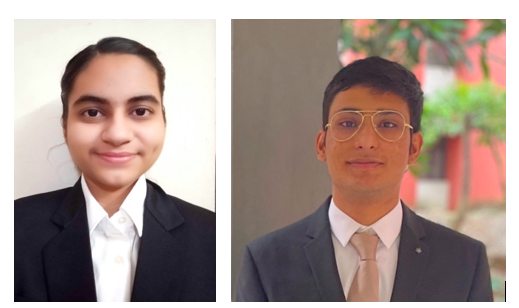
Our readers would have noticed that since November 2023, we have been publishing hard hitting, incisive posts by our fantastic two new SpicyIP Student Fellows Yogesh Byadwal and Tejaswini Kaushal. Yogesh is a second year student from the National Law School of India University, Bengaluru and Tejaswini is a third year student from Dr. Ram Manohar Lohiya National Law University, Lucknow. Yogesh and Tejaswini were among our most diligent interns and subsequently joined the team as a part of the coveted SpicyIP Fellowship Programme. Readers can check their recent posts here and here respectively.

Following up on the news about the SpicyIP Student Fellows, we are very happy to announce the inaugural Fellow for the SpicyIP Doctoral Fellowship 2023-24, Ms. Malobika Sen! On May 14, 2023, coinciding with Prof. Shamnad Basheer’s 47th birth anniversary, we called for applications for the first ever SpicyIP Doctoral Fellowship. Devised keeping in mind our commitment to fostering transparency and accountability within the Indian IP regime, the SpicyIP Doctoral Fellowship is awarded to a PhD candidate pursuing their doctoral studies in the broad area of intellectual property rights and/or innovation policy, and with a focus on public interest, transparency and accountability, or socially beneficial legal and policy levers
About the Inaugural SpicyIP Doctoral Fellow
Malobika is a 2nd year PhD Scholar and a full-time Teaching Assistant at the West Bengal National University of Juridical Sciences under the guidance of Prof. (Dr.) Anirban Mazumdar, (Supervisor) and Dr. Sanjit Kumar Chakraborty (Co-Supervisor). She was awarded the WBNUJS University Junior Research Fellowship (2021-2022) and is presently co-teaching third-year students Labor Law and Industrial Relations II. Additionally, she offers an elective course on Disability Law and Legal System.
Considering that IP disputes often involve technical subject matters, different High Courts have accommodated provisions for appointing independent subject matter experts and also allow parties to file affidavits in evidence by their respective experts to assist the Court in understanding the nitty-gritty of the subject matter IP. For instance, see Rule 2(f) and 31 of the Delhi High Court IPD Rules. In light of this fascinating but often under-discussed part of IP dispute adjudication, Malobika aims to explore and understand the contributions of “experts” in unraveling the complicated issues involved within IP adjudications by different High Courts. At SpicyIP, we believe that Malobika’s research holds immense potential to drive meaningful change and contribute to evidence-based policymaking in the realm of intellectual property rights.
Malobika writes in on what led her to her topic and what the focus of her research and her goals are going to be. Here is what she has to say!
Can You Tell Us a Bit About Your Dissertation Topic and How You Came to Choose It?
My doctoral study shall encompass a comprehensive examination of the contribution of ‘experts’ and their knowledge in IP adjudication and also study the procedure for selecting and engaging such experts, all aimed at understanding the facilitation of the effective adjudication of intellectual property (IP) litigation. The idea for this study was conceived when I was working as a Law Clerk cum Research Assistant under Justice Soumen Sen of the Calcutta High Court. During this time I was also a part of the research team engaged in assisting J. Sen for his participation in the National Seminar on Adjudication of Intellectual Property Rights (IPR) Disputes 2022. The Seminar saw the participation of judges from Gujarat, Bombay, Madras, and Calcutta High Courts and J. Sen was representing the Calcutta High Court in the Seminar. In the course of background research for the seminar, I came across several pieces by Late Professor (Dr.) Shamnad Basheer elaborating upon the role of the Intellectual Property Appellate Board (IPAB), questions of due process in the above forum, and the resultant impact on India’s IPR Regime. Incidentally, Dr. Basheer’s view was echoed by a few members of the Panel of the said seminar. What transpired was an understanding that the role of an expert could maybe aid the adjudication of IP Benches when faced with disputes involving scientifically nuanced issues in IP disputes. It became clear that there was a ‘recognised uncertainty’ in the engagement of experts by IP benches after the abolition of the IPAB. To understand whether such engagement of experts to IP benches could be useful, a study of this issue becomes imperative. Further discussion with different stakeholders involved in the adjudication of IP disputes indicated the dearth of research in this area, and I was encouraged to pick this up as the topic of my doctoral studies. I would especially like to acknowledge Hon’ble J. Sen, Prof. (Dr.) Nirmal Kanti Chakrabarti (Hon’ble Vice Chancellor WBNUJS), Prof. (Dr.) Anirban Majumdar Professor of Law (WBNUJS) and Dr. Sanjit Kumar Chakraborty, Associate Professor (WBNUJS) for guiding me during the initial conception of this study.
What is the Focus of Your Research and What are Your Perceived Goals?
I think that the abolition of the IPAB and the subsequent transfer of pending matters to the designated High Courts have underscored a pressing need for having standardized mechanisms in IP dispute resolution. A crucial aspect of this transition is the appointment of experts by different IP Benches and the evaluation of their submissions as evidence. While the Delhi High Court and the Madras High Court have taken proactive steps by establishing their own Intellectual Property Divisions (IPD) with comprehensive rules, other High Courts such as those at Calcutta, and Bombay are at various stages of progress in this regard. However, seemingly there is a lack of consistency in rules and procedures among these High Courts. It is to be noted that following the abolition of the IPAB, there is no mandate for IP benches to be staffed with a technical member or a judicial member with a technical background (unlike, for example, specialized benches of the National Green Tribunal, a forum where equally technically nuanced or scientific disputes are adjudicated). Therefore, the role of experts becomes crucial in filling this void by guiding the courts through technical labyrinths that may crop up in a high-stakes IP dispute. However, it has been identified that there is a presence of non-uniform IP procedural rules at the High Courts. This, along with the apprehension that these IP Benches may lack the requisite technical/academic/scientific knowledge for adjudication, and may benefit from the engagement of experts, a study dedicated to such an idea may prove to be vital for the decision-making of the IP Benches. Additionally, concepts used in other jurisdictions, such as hot-tubbing, confidentiality clubs, and court assessors for High Court IPDs, and which are extensively discussed in WIPO Intellectual Property Judges Forum 2023 as different approaches taken among different jurisdictions, are yet to be fully developed in Indian IP litigation. Therefore, not only there is a need to analyze the role of experts and their knowledge and their contribution to the decision-making process of the IP Benches of the High Courts but also there is a crucial need for research and collaboration among stakeholders to address and study the suspected challenges and to make an effort to develop standardized mechanisms that could ensure consistency, fairness, and efficiency in IP dispute resolution across High Courts.
How is the Fellowship Useful for You in Accomplishing the Above Goals?
The fellowship is crucial as it provides the necessary support to overcome the challenges inherent in conducting this study. One of the primary challenges is accessing judges, lawyers, advocates and other stakeholders in the city of New Delhi, Bombay, Bangalore and Madras. Since I am based out of Kolkata, navigating to the Calcutta High Court is relatively easier; however, data collection at other cities necessitates funds for travel, accommodation, and study. The fellowship can alleviate financial constraints, enabling me to access these High Courts and gather essential data effectively. Engaging in research projects undertaken by the SpicyIP team and writing for the blog on this topic will not only facilitate widespread dissemination of my research at earlier stages but will also aid in soliciting comments from scholars and peers, thereby enhancing the overall quality of the doctoral study. Additionally, the Fellowship offers an opportunity to discuss my progress with the SpicyIP team and get feedback on the same by them. Apart from the above, balancing teaching and other administrative commitments as a full-time teaching assistant at WBNUJS poses a significant challenge for me. The fellowship provides the flexibility to dedicate adequate time and effort to the study, ensuring its successful execution despite these challenges. Overall, the fellowship plays a pivotal role in enabling me to address obstacles and conduct comprehensive research on IP dispute adjudication in India.
___
We’re very excited to see what Malobika’s research finds and her contributions to the discourse around the need for subject matter experts in IP litigation. A very big congratulations to her! And once again, to our SpicyIP Student Fellows Yogesh and Tejaswini, as they continue on an exciting journey into the captivating world of IP!
- SEO Powered Content & PR Distribution. Get Amplified Today.
- PlatoData.Network Vertical Generative Ai. Empower Yourself. Access Here.
- PlatoAiStream. Web3 Intelligence. Knowledge Amplified. Access Here.
- PlatoESG. Carbon, CleanTech, Energy, Environment, Solar, Waste Management. Access Here.
- PlatoHealth. Biotech and Clinical Trials Intelligence. Access Here.
- Source: https://spicyip.com/2024/02/announcing-the-spicyip-inaugural-doctoral-fellowship-candidate.html



